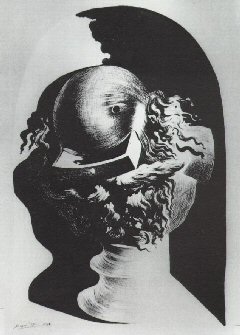At the Techonomy conference in August 2010, Google’s CEO Eric Schmidt said that through artificial intelligence Google can predict human behavior and that if we show Google 14 pictures of ourselves, it can even identify who we are—a boastful statement, but not far from the truth.
The ordinary human mind works mostly as a mechanism based on past conditionings. And it becomes even more mechanical through interacting continuously with machines. So there’s little surprise that some well-written software can infer with good accuracy who we are, what we want, which website we will visit, where we will go next while on the street. Google knows of every Web page we visit, every advertisement we click on and probably—with their mathematical and analytical tools that can interpret location, web navigation, connections with people, and email messages—much more than we can imagine.
In case our behaviour can’t be predicted, Google can always tell us what we should do, because, in Schmidt’s words, people “want Google to tell them what they should be doing next”, as reported by Nicholas Carr1. As much as his words are unnerving, there’s, again, more than a hint of truth in them. Our will and inner direction are activated by the connection with our “belly center”—that place which any martial arts practitioner moves from.
This center is weakened by overusing the mind without a felt, alive and aware connection with the body, which is the ground for our search for truth. Lacking this connection, we seek guidance from technology even for the most basic decisions, just as we ask Google for anything which could be retrieved with a little effort by our memories.
This transforms all of us into helpless babies needing suggestions or confirmation from Mother Google for all our activities. Or at best into rebellious teenagers ignoring her hints, but showing up at dinner time.
Possessive mothers want their children to be dependent on them, not wanting them to grow up, seducing them with their tastiest dishes (free and entertaining software tools) and providing for all of their needs—while resisting their children’s every effort to go out from home unsupervised. Anywhere we go we leave a trace for Google. The children, then, will never face the real world—nor their real selves.
1. Brave New Google.
See also: Mail Goggles
Mother Google
The Tao of Google Ranking
Google, Privacy and the Need to be Seen
Alla conferenza di Techonomy di Agosto 2010, il CEO di Google, Eric Schmidt, ha affermato che, grazie all’intelligenza artificiale, Google è in grado di predire il comportamento degli esseri umani. Inoltre, se gli mostriamo 14 immagini di noi stessi, Google può identificare chi siamo. Sono dichiarazioni roboanti, ma non lontane dal vero.
La mente umana, in genere, opera principalmente come un meccanismo basato sui condizionamenti passati, ma diventa ancora più meccanica quando interagisce continuamente con le macchine. Quindi, non sorprende che un software ben congegnato possa dedurre con discreta accuratezza chi siamo, cosa vogliamo, quali siti web visiteremo e dove andremo la prossima volta che scenderemo in strada. Google conosce ogni pagina Web che visitiamo, tutte le pubblicià che clicchiamo e probabilmente – attraverso i suoi strumenti matematici e analitici in grado di identificare e collegare località, navigazione on-line, email e contatti con le persone – molte altre cose che nemmeno immaginiamo.
Nel caso in cui il nostro comportamento non sia prevedibile, Google può sempre dirci cosa dovremmo fare, dal momento che, per usare le parole di Schmidt, riportate da Nicholas Carr1, la gente “vuole che Google le dica cosa deve fare il momento successivo”. Queste parole sono inquietanti, ma, di nuovo, con un fondo di verità. La nostra volontà e il nostro senso di direzione interiore si attivano quando entriamo in contatto con il nostro “centro della pancia”, quel luogo da cui si muovono tutti i praticanti di arti marziali.
Tale centro si indebolisce in caso di uso eccessivo della mente e di mancanza di una connessione viva, sentita e consapevole con il corpo, che rappresenta il punto di partenza per la nostra ricerca della verità. Quando tale connessione è assente, chiediamo alla tecnologia di guidarci anche nelle decisioni più elementari, così come ricorriamo a Google per cose che in realtà potremmo richiamare alla memoria con poco sforzo.
In tal modo, diventiamo come dei bambini smarriti e bisognosi di consigli e conferme da mamma Google per tutte le nostre attività. O, al massimo, dei teenager ribelli che ignorano i suoi consigli, ma puntualmente si fanno vivi all’ora di cena.
Le madri possessive vogliono che i figli dipendano da loro e non crescano: per questo, li seducono con piatti succulenti (strumenti software gratuiti e accattivanti) e soddisfano tutti i loro bisogni, resistendo a qualsiasi loro tentativo di uscire da casa senza essere sorvegliati. Dovunque andiamo, lasciamo una traccia per Google. Così i bambini non affronteranno mai il mondo reale, né il loro sé autentico.
1. Brave New Google.
Vedi anche: Mail Goggles
Google, la privacy e il mettersi in mostra


